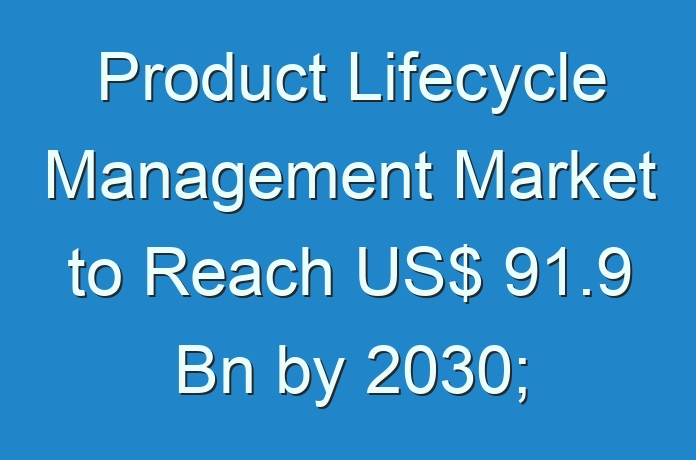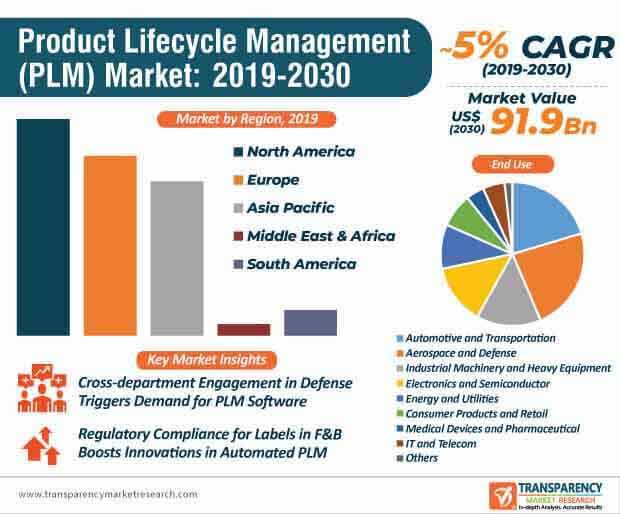
Online Events Educate Users about Remote Monitoring of Production Activities amidst COVID-19 Crisis
Digital transformation is the key to address challenges created by the COVID-19 (coronavirus) outbreak. Users in the manufacturing and retail sectors are participating in webinars to stay ahead in competition amidst the coronavirus era. For instance, Centric Software- a Silicon Valley-based software company conducted a seminar in March 2024 that shed light on how digitalization drives business growth with the help of the product lifecycle management software.
Companies in the Product Lifecycle Management (PLM) market should increase efforts to conduct online events that educate users on how they can deploy better collaborations and communication with the help of the PLM software. As such, decline in costs and streamlining of production processes are catalyzing the adoption of PLM. Remote monitoring of production activities is another advantage for users amidst the COVID-19 pandemic that will, in turn, drive the Product Lifecycle Management (PLM) market.
Want to know the obstructions to your company’s growth in future? Request a brochure @ https://www.transparencymarketresearch.com/sample/sample.php?flag=S&rep_id=4548

Automated Management of Labels in F&B Bolsters Adoption of Product lifecycle Management
Product Lifecycle Management (PLM) is being adopted by F&B (Food & Beverage) manufacturers for product innovation and transparency in production practices. Stringent compliance pressures and the ever-increasing demand for quality products have catalyzed the adoption of PLM in F&B companies. F&B manufacturers are benefitting from PLM, since these software deliver important data about the likelihood of projects being successful. Product lifecycle management helps in regulatory compliance for labels and ingredients, which helps to increase product uptake.
Efficient information management has become instrumental to achieve transparency in internal and external processes. Hence, companies in the Product Lifecycle Management (PLM) market are innovating in software that effectively manage customer inquiries. Automated management of labels is another key driver that is bolstering growth for the Product Lifecycle Management (PLM) market, which is estimated to cross a value of US$ 91.9 Bn by the end of 2030.
Cloud PLM Deploys Low Cost Implementation as Compared to On-premises Solutions
Cloud product lifecycle management software are being highly publicized in various end markets. This explains why the product lifecycle management (PLM) market is estimated to advance at a favorable CAGR of ~5% during the assessment period. Easy to implement and real-time collaboration provided by cloud product lifecycle management software is generating value-grab opportunities for companies. As such, PLM helps internal teams and supply chain partners design, develop, and produce high-quality products for its target customers.
Product lifecycle management supports new product development (NPD) and new product introduction (NPI) in a budget-friendly manner. Companies in the Product Lifecycle Management (PLM) market are capitalizing on the trend of real-time collaboration, which requires information sharing between internal and external teams. Cloud PLM is increasingly replacing on-premises solutions, owing to its advantages of low cost implementation and cheaper maintenance.
Looking for exclusive market insights from business experts? Request a Custom Report
Need For Engagement with Extended Supply Chain Triggers PLM Adoption in Defense
Apart from consumer goods and the retail sector, vendors in the product lifecycle management (PLM) market are tapping into opportunities in the aerospace & defense sector. Since products used in the aerospace & defense industry are potentially complex and interdependent, end users are raising the demand for PLM software. In the face of constant innovation in the aerospace & defense sector, companies are making available advanced PLM systems that are capable of streamlining the flow of information. With the help of the product lifecycle management, users in the aerospace & defense sector can better engage with the extended supply chain and practice simultaneous development among cross-department teams.
Companies in the product lifecycle management market are innovating in software that help to improvise the performance in aircraft production and reduce costs. For instance, UEC Saturn— a Russian aircraft engine manufacturer is acquiring global recognition with its PLM software NPO Saturn by joining forces with the Siemens PLM Software technologies.
Read Our Trending Press Release Below: https://www.prnewswire.co.uk/news-releases/deployment-in-automotive-industry-drives-rapid-penetration-of-automated-guided-vehicle-market-industry-4-0-to-herald-evolution-observes-tmr-825095304.html





